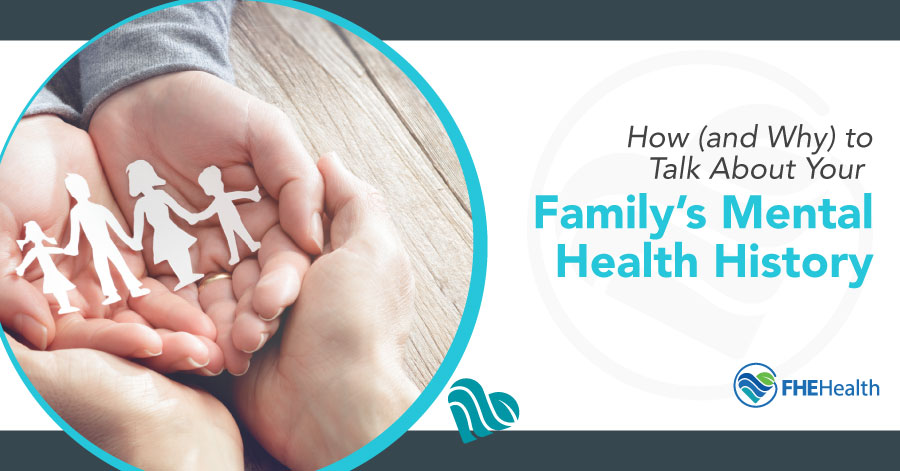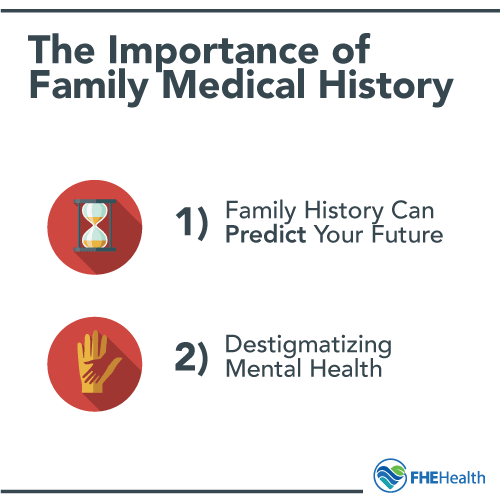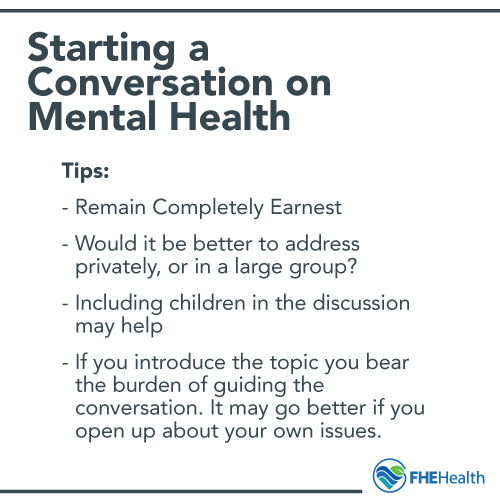
As we continue to learn more about mental health and the origins of many mental illnesses, family mental health history continues to become a more focal issue, and not without good reason. More information comes out every year that suggests that mental illness is passed down genetically, meaning that if a person’s relative has a certain mental illness, there is a higher-than-average chance that their direct blood relatives have it as well.
In addition, a frank, open and accepting conversation about mental illness can remove several of the reasons why these discussions are so difficult. Here’s why you and your family shouldn’t shy away from the topic of mental illness during the holidays.
Why Is Knowing Your Family Mental Health History Important?
It’s never a bad thing to get a better understanding of the health situations present in your family, but two reasons stand out in explaining why it’s so important to make mental health a focal point of conversation with family, even if it’s not the easiest topic to bring up.
Mental Conditions and Genetic Factors
 In the past, the origins of serious mental health conditions like depression, schizophrenia, bipolar disorder and even autism were suspected to be hereditary — passed down in the genetic makeup of blood relatives.
In the past, the origins of serious mental health conditions like depression, schizophrenia, bipolar disorder and even autism were suspected to be hereditary — passed down in the genetic makeup of blood relatives.
Now, more evidence is coming out that makes scientists surer of this hunch. The National Institutes of Health (NIH) made public a discovery uncovered by genomic researchers: common patterns appear in the genetic markers of people who suffer from a common mental health condition. This all but confirms what scientists long thought to be true — a family history of mental illness is among the most prominent predictors of a given condition.
Talking about mental health with a group of family members at a holiday gathering can put it all out in the open, giving younger family members crucial insights about what to look for in themselves and their close family members to try to detect developing mental illness before it becomes too damaging.
Starting the Discussion
It’s no secret that there’s a stigma around talking about or seeking treatment for mental health. Each year, however, that stigma is shrinking. More and more people are confronting the fact that diseases don’t discriminate and it’s okay to admit that they’re struggling.
One barrier that many people cite as their reason for being hesitant to talk about their issues, however, is the lack of support of family and friends. While talk of mental illness is much more common among millennials and older members of Generation Z, older family members may not be as familiar. It’s no surprise, then, that older people are increasingly suffering from mental illness, brushed off as simply “normal aging.”
The fact is, family experiences and mental health are undeniably intertwined. While having a close friend to talk to about your issues is important, family issues are often a major factor in the time line of mental health. For example, issues with loved ones and family members make up the top two sources of trauma in the life of the average woman.
Why Are People Guarded About Mental Health?
For many people, mental health is just not something that people should talk about. They don’t understand the value in seeking therapy, or medication, or even just talking to a close friend about things that are affecting their mental well-being in life. For so long, the stigma made sure frank discussions about mental health were something people wouldn’t consider.
That’s part of the reason why families don’t have conversations about the topic, especially in the extended family setting. Older family members, having grown up in a time where such topics were taboo, may be less likely to be accepting of the conversation. Another possibility is that extended family members who don’t often see each other may not feel comfortable enough to broach the topic of family mental health history.
How to Start the Conversation
 The biggest challenge with starting an earnest discussion about mental health in a family setting is getting the conversation off the ground. Here are a few tips to ensure that talks are productive:
The biggest challenge with starting an earnest discussion about mental health in a family setting is getting the conversation off the ground. Here are a few tips to ensure that talks are productive:
How to Bring It Up
The fact is that no matter how you bring up an issue as sensitive as mental health, it won’t be easy. You likely know the members of your family well enough that you know the best way to get everyone to respond to a potentially awkward discussion. With this in mind, we recommend that you remain completely earnest during the ramp-up to the open, honest discussion.
This because if some family members don’t feel like you’re taking the practice as seriously as possible, they may not feel as open and supported talking about their mental health, past and present. You don’t want to alienate anyone during the potentially crucial practice.
One-on-One or in a Group?
This is another issue where your knowledge of your own family can help answer the question. If you’re from a very close-knit family with a lot of openness, it may be more productive to speak openly in a group setting. If you think that this type of environment may keep some family members from feeling comfortable speaking openly, consider making it a more private conversation.
Don’t Shield Children From the Talk
Mental health and the many issues that accompany it may seem like mature topics, so you may experience the urge to not allow the kids to be part of the conversation, and in some cases — like talks about suicide, for example — this may be the best choice.
However, it may do more harm than good to hide children from discussions of mental health completely. These issues inherently affect children, and introducing mental health at a young age promotes understanding and acceptance as children come into contact with it later on.
Adopt a Universally Supportive Tone
If you’re taking responsibility for starting a conversation about mental health with your close relatives, understand the burden it puts on you to do so. Speak in a way that encourages family members who are currently struggling or have struggled in the past to open up about their experiences.
Sharing Information Improves Outcomes
When family members open up with each other about sensitive topics, everyone becomes a lot closer. Even more, when you understand the full picture of your family’s mental health history, everyone can be more informed about the risks.
What happens when you learn new information about a mental illness that runs in your family? It’s important not to panic. Mental health treatment is providing better outcomes every day, and with early detection, a diagnosis of mental illness doesn’t have to harm your quality of life.
To learn more about starting a family discussion about mental health this holiday season, contact FHE Health today.






